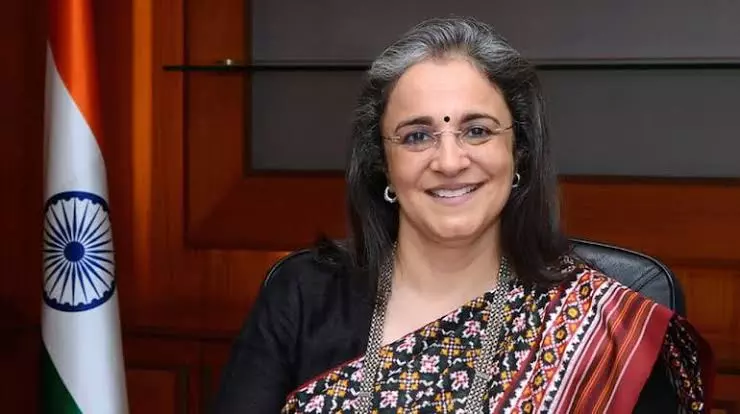
The tenure of Madhabi Buch has come under scrutiny following allegations by Hindenburg Research regarding potential conflicts of interest and financial misconduct. | File photo
SEBI chief: Govt seeks ‘high-Integrity’ leader to replace Madhabi Buch
Madhabi Puri Buch’s tenure has been riddled with controversies and challenges that have overshadowed her leadership

The Union government has begun the process of finding a replacement for Madhabi Puri Buch, the controversial chairperson of the Securities and Exchange Board of India (SEBI), whose three-year term is set to end on February 28, 2025. Emphasising the need for “high integrity, eminence, and reputation,” the Department of Economic Affairs under the Union Finance Ministry has invited applications for the top regulatory post.
According to the public advertisement issued on Monday, the candidate must possess more than 25 years of professional experience and preferably be above the age of 50. “The chairman should be a person who does not and will not have any such financial or other interests as are likely to affect prejudicially his function as the chairman,” the advertisement stated.
The advertisement further highlighted that the ideal candidate should demonstrate expertise in addressing challenges related to securities markets or possess specialised knowledge or experience in law, finance, economics, or accountancy—skills deemed essential for effectively leading the board. The new chairperson will be appointed for a maximum term of five years or until age 65, whichever is earlier, and will receive a monthly remuneration of ₹5,62,500, excluding housing and transport benefits.
Also read: Adani, SEBI rows rewrote corporate narratives amid declining governance standards in 2024
Buch's tenure and controversies
Madhabi Puri Buch, who took charge as SEBI’s chairperson in March 2022, made history as the first woman to head the regulatory body. Her tenure has been riddled with controversies and challenges that have overshadowed her leadership.
The most prominent controversy involved SEBI’s handling of the allegations raised by Hindenburg Research against the Adani Group. The report, which accused the conglomerate of stock manipulation and fraudulent accounting, shook investor confidence and raised questions about regulatory oversight in India’s financial markets. Critics questioned SEBI’s perceived sluggish response to the crisis and its preparedness to address systemic risks posed by corporate malpractice.
The tenure of Madhabi Buch has come under scrutiny following allegations by Hindenburg Research regarding potential conflicts of interest and financial misconduct. The report accused Buch and her husband, Dhaval Buch, of owning stakes in offshore funds linked to the Adani Group, which SEBI has investigated for alleged financial irregularities. These claims raised questions about her impartiality in overseeing the probe.
Hindenburg also alleged that Buch’s consulting firm, in which she holds a 99 per cent stake, received payments from companies regulated by SEBI, including Mahindra & Mahindra and ICICI Bank, during her tenure as a whole-time member. The report suggested this indicated a lack of transparency and possible impropriety.
Investment in offshore entities
Further allegations included investments by Buch in offshore entities tied to the Adani Group and claims that her husband sought to become the sole operator of their accounts shortly before her SEBI appointment, potentially to obscure financial activities.
Both Madhabi and Dhaval Buch have vehemently denied these allegations, describing them as “baseless” and asserting that all financial disclosures were made to SEBI. In their response, they expressed disappointment over what they called a character assassination attempt by Hindenburg.
Internally, Buch’s tenure has also been marred by unrest among SEBI staffers, with recent allegations of a toxic workplace culture. Reports of dissatisfaction over excessive work pressure, lack of transparency in decision-making, and inadequate grievance mechanisms have raised concerns about employee morale within the regulatory body.
Also read: Rahul on Madhabi Buch: Financial ties with firms have turned watchdogs into allies
The legacy of SEBI leadership
The role of SEBI chairperson has traditionally been tenured for three years, though exceptions have been made. UK Sinha served as SEBI chairperson for six years (2011–2017), while his successor, Ajay Tyagi, held the post for five years (2017–2022).
Under Buch’s leadership, SEBI introduced measures to protect retail investors, improve disclosure standards, and combat market malpractices. However, the controversies surrounding her term have underscored the need for a leader with firm ethical grounding and a proven ability to navigate complex regulatory challenges.
The February 17 application deadline gives the Financial Sector Regulatory Appointments Search Committee just over a month to finalise its recommendations. As the term of Buch winds down, all eyes will be on the government’s choice to lead SEBI into its next chapter.

